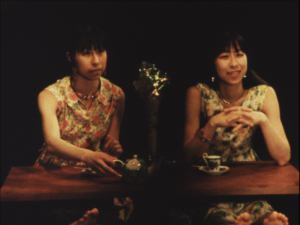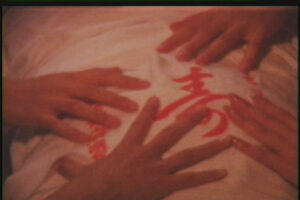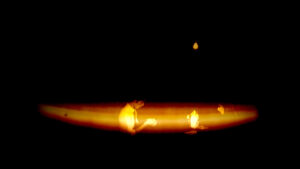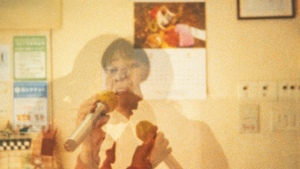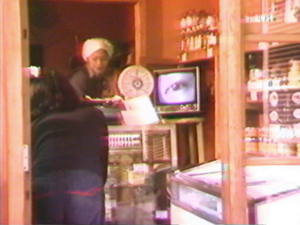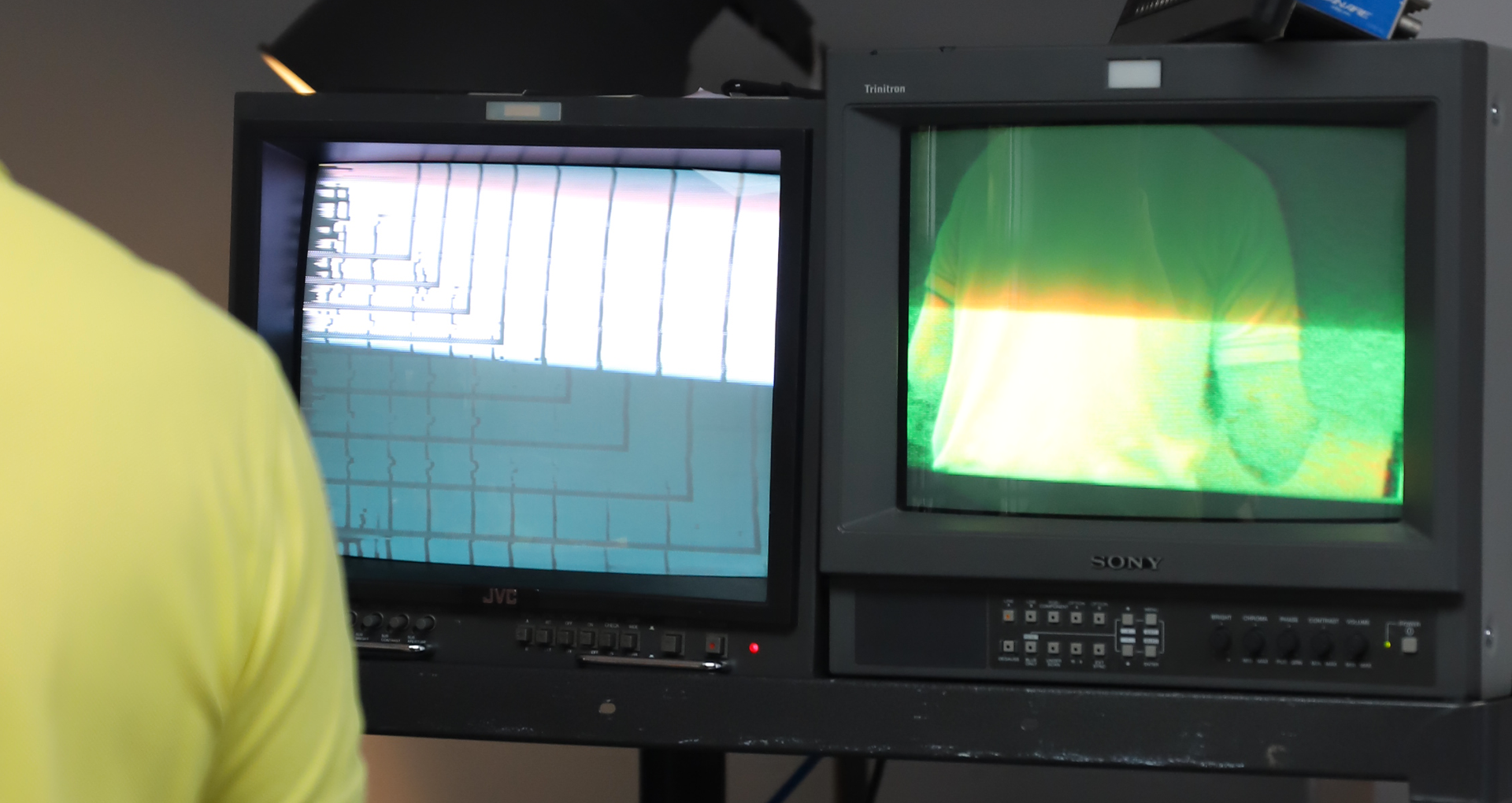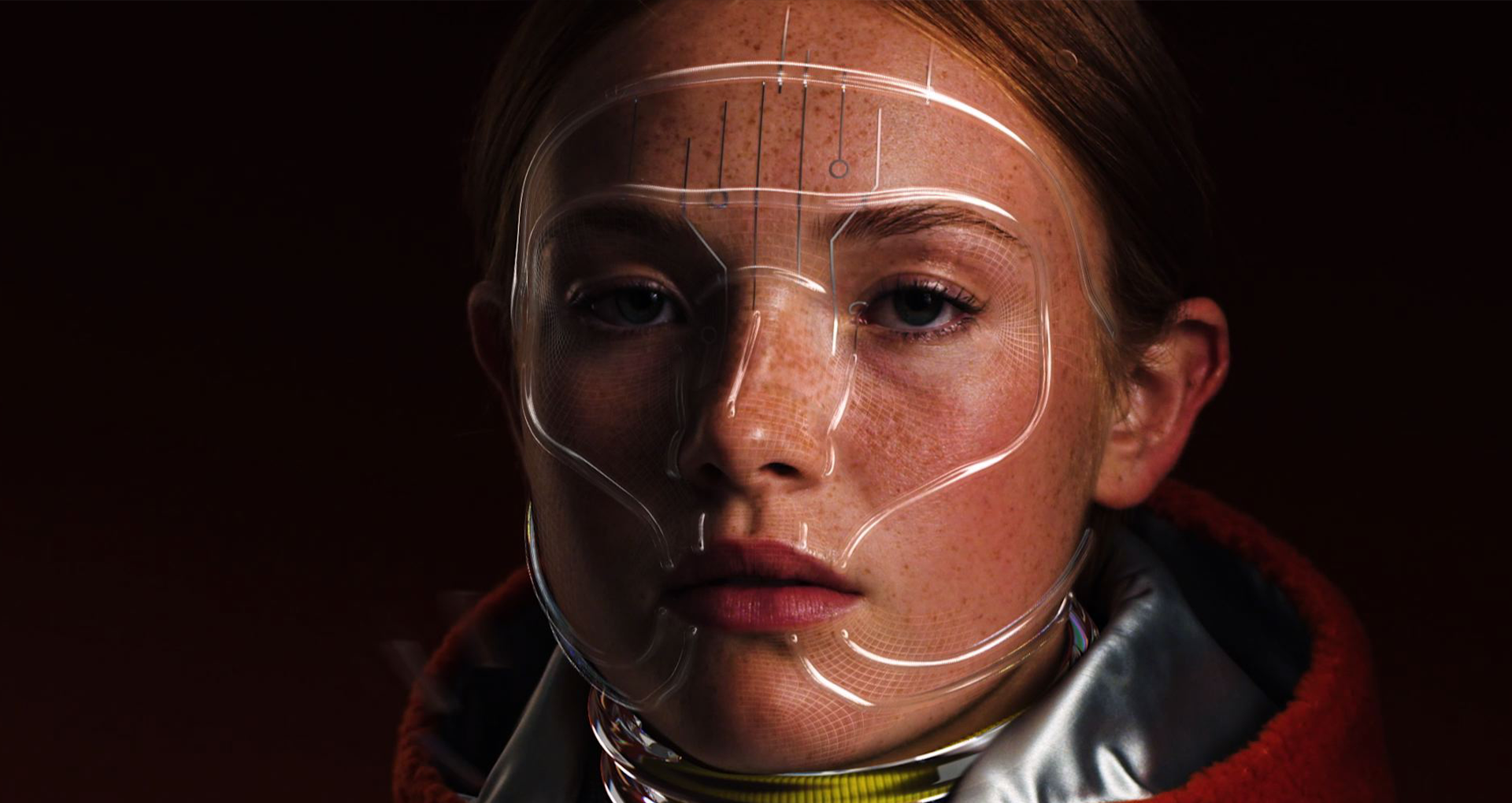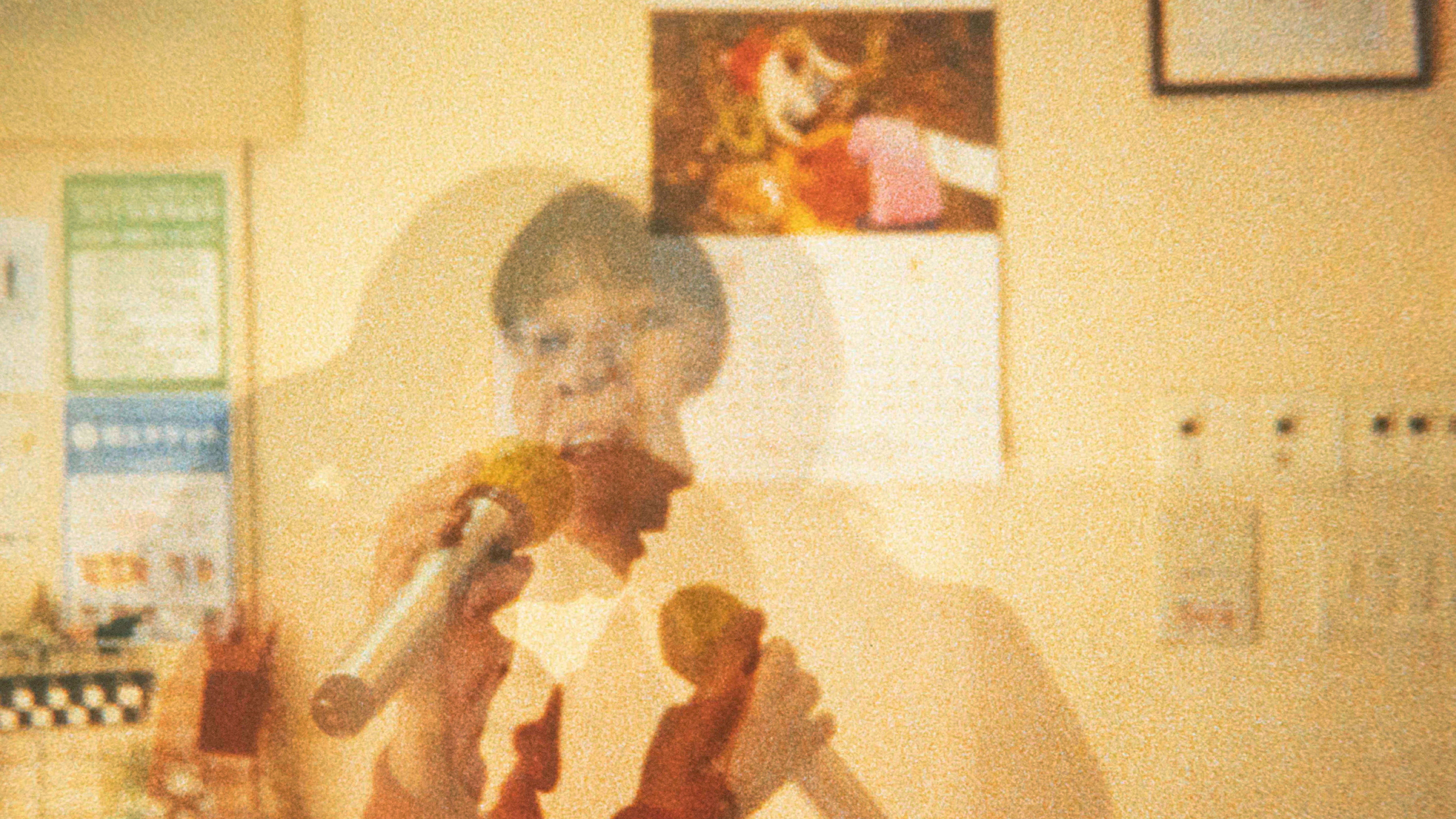
© Kaori Oda, Karaoke Cafe BOSA, 2022
dv_vd
Japanese filmmakers and feminism – 1970s to present: Through their own eyes, in their own times
PROGRAMMING
Free
For the 2023 season of the dv_vd series, Vidéographe and Dazibao have invited the talented artist and curator Yuka Sato to present a program of works offering us a rare perspective on Japanese feminism going back to 1970.
CURATORIAL STATEMENT
This program focuses on Japanese feminist approaches from the 1970s to the present through a selection of film works by Mako Idemitsu, Utako Koguchi, Kayo Takefuji, Yuka Sato and Kaori Oda. Coming from different generations and backgrounds, these artists present their unique perspectives and feelings on topics such as physicality, sexuality and family, conveying them to the audience in the form of moving images.
These films, which can be considered feminist practices, can challenge patriarchy and authority, while also raising questions about gender norms.
They also recall the slogan of second wave feminism, “The personal is political.”
What message does each artist’s vision convey to those living in these challenging times?
With that in mind, I hope you enjoy these films.
– Curator Yuka Sato
PROGRAM (65 MIN)
- Mako Idemitsu 出光真子, Another Day of a Housewife 『主婦の一日』, 10 min, 1977
- Utako Koguchi 小口詩子, A Dandelion[Rosaceae]/Bara-ka tanpopo 『バラ科たんぽぽ』, 9 min, 1990
- Kayo Takefuji 竹藤佳世, Bone and Flesh Cogitation『骨肉思考』, 26 min, 1997
- Yuka Sato 佐藤優香, In the Room 『In the Room』, 7 min, 2014
- Kaori Oda 小田香, Karaoke Cafe BOSA 『カラオケ喫茶ボサ』, 13 min, 2022
Support: Image Forum Kenji Kadowaki
Translation support: Minako Okamoto
SYNOPSIS AND BIOGRAPHIES
Mako Idemitsu 出光真子
Another Day of a Housewife 『主婦の一日』
SYNOPSIS
Another Day of a Housewife
This video was made in those days when I was really fed up with being a house wife. In the endless repetition of routine house chores I noticed another “me” was watching the house wife “me.” Who am I? What is it to live? I wanted to share these questions with others.
BIOGRAPHY
Mako Idemitsu
Born in Tokyo in 1940, Idemitsu grew up in a very old fashioned, male-dominant, typical patriarchal family. This later became the basis of her works, whose main theme is the issues of family oppression against women.
She married Sam Francis, a painter of abstract expressionist. While they lived in California, she became a mother of two children. Idemitsu began to take the film from the conflict of identity as a mother.
In 1972 she filmed the “Women’s House” of Judy Chicago and others, in order to create an imagery based on this work. The next year she returned to Japan and started to make video works as well as films.
After the 1980’s, Idemitsu’s videos were highly received overseas.
Her videos depict such explicit feminist issues. She developed a unique technique of her own called “Mako style”, where a person’s inner world is projected on a small monitor installed in a larger screen.
Her latest work in the year 2004 is an installation Past Ahead.
Utako Koguchi 小口詩子
A Dandelion[Rosaceae]/Bara-ka tanpopo 『バラ科たんぽぽ』
SYNOPSIS
A Dandelion[Rosaceae]/Bara-ka tanpopo (9mins, 1990)
Lulu and Lala are twin sisters, but live apart from one another.
When Lala is watching a video of beautiful boys at midnight, by chance she finds her father appear in it. She is very shocked at seeing his naked hips. It makes her go wrong and suddenly transforms into a boy. She goes to Lulu’s house to show off her penis. There Lala finds that Lulu has also changed to a boy already. They fight a fierce and vulgar battle, transforming their “things” one after another and competing for their size. After all, Lulu submits herself to Lala and returns to a girl. She presents her penis cut off and decorated artistically to her sister. But it is infected with AIDS virus and undermines the two girls making love. While fucking, they remember their old happy days, when they were still innocent and on good terms with each other. They are thrown in ecstasies with consciousness dying away.
BIOGRAPHY
Utako Koguchi
Born in Tokyo. She has engaged in various activities, such as dance instruction, film, TV, commercials, music video, promotion videos, website design, publicity of foreign films, staffing film festivals, and writing.
As a filmmaker, she has actively exhibited her works at film festivals and featured programs both in Japan and abroad with live performances. She has also engaged in activities to support young filmmakers through workshops, film festivals, and educational institutions. She currently teaches at Musashino Art University, where she has engaged in producing filmmakers who won prizes at various competitions. In 2014, she founded “The Poetry of Finless Porpoises/sunameri no uta” project, with young filmmakers, students, and local citizens in Ōmura City in Nagasaki, where she produced nine short films that were screened at various film festivals. She was a director of Omura Amami International Student Film Festival in 2018, and a vice executive committee at the 14th Asia International Youth Film Festival in 2021.
Kayo Takefuji 竹藤佳世
Bone and Flesh Cogitation 『骨肉思考』 (26mins 1997)
SYNOPSIS
Bone and Flesh Cogitation (26 mins 1997)
A film about the film maker’s own pregnancy and birthing experience.”We celebrate the ability to give birth, but if this is so, shouldn’t we regard all life as blessed? Am I blessed?”
The filmmaker twists the question of expression by taking the point of view of the camera and objectifying herself through ultrasonic images of the baby right before birth, and talk with family.
Shooting these images day by day is the process by which the film maker grapples with the question of her own existence. It is, in fact, an attempt to witness her own birth.
BIOGRAPHY
Kayo Takefuji
Director, Producer. Born in Tokyo. Graduated from Tokyo Metropolitan University and Image Forum Institute of Moving Image. After working for an advertising company, started teaching at a film school, and worked as a film crew for Koji Wakamatsu and Naomi Kawase. Now teaching as Associate Professor of Faculty of Media Studies, Josai International University.
Yuka Sato 佐藤優香
In the Room 『In the Room』 (7mins 2014)
SYNOPSIS
In the Room (7mins 2014)
The room can be interpreted as the social structure which the protagonist doesn’t know how to escape from. Her relationships are torn into pieces and sewn back together.
But in the end, the oppressed are still left broken.
BIOGRAPHY
Yuka Sato
Filmmaker / artist. Yuka’s filmography has to date encompassed the themes of isolation in society, dialogues with others and women’s lives. She has presented her films both in Japan and overseas.
In recent years, she has been experimenting and researching mainly through photography, with a focus on things that are often treated as seemingly unnecessary or potentially ambiguous.
She also works as an independent curator and was the director of events such as the Place M Film Festival 2019 and 2021.
Kaori Oda 小田香
Karaoke Cafe BOSA 『カラオケ喫茶ボサ』 (13mins 2022)
SYNOPSIS
Karaoke Cafe BOSA (13mins 2022)
Karaoke Cafe BOSA is located in the suburbs of Osaka, Japan. It’s a place where elderly neighbors gather to chat and sing. Cafe BOSA leaves traces in these days of unrest as a time capsule of the Anthropocene.
BIOGRAPHY
Kaori Oda
Born in Osaka (Japan), 1987. Filmmaker/Artist. Through images and sounds, her works explore the memories of human beings.
She lived in Sarajevo for three years from 2013 and completed the Doctor of Liberal Arts in filmmaking under the supervision of Bela Tarr in 2016. Her first feature, ARAGANE (2015) shot in a Bosnian coal mine, had its World Premiere at YAMAGATA International Film Festival and received Special Mention. The film has been screened at festivals such as Doclisboa, Mar del Plata IFF, Sarajevo FF, Taiwan International Documentary FF, and more.
She is a recipient of Grants for Overseas Study by Young Artists of Pola Art Foundation.
Her second feature, Toward A Common Tenderness (2017) a poetic film research, had its World Premiere at DOK Leipzig and her latest film, TS’ONOT/Cenote (2019) shot in underwater caves in Yucatan Mexico, was premiered in Bright Future section at International Film Festival Rotterdam 2020.
She received the Inaugural Nagisa Oshima Prize in 2020 and the new face award of Minister of Education Award for Fine Arts in 2021.
日本の映像作家とフェミニズム 1970年代から現在ー 異なる風景や時間のなかで
1970年代から現在に至る日本の映像作品の中から、フェミニズムに焦点を当てて構成した上映プログラムです。5名のアーティスト、出光真子、小口詩子、竹藤佳世、佐藤優香、小田香 (上映順) が参加。世代もバックグラウンドも異なる作家たちが、個人の感情、身体、性、家族などの私的領域を独自の視点で切り取り、映像という形で観るものに投げかけます。
これらフェミニズムの実践ともいえる作品群は、家父長制や権力への抵抗、社会のジェンダー規範などに対する違和感を含んでいるともいえます。そしてまた、「The personal is political (個人的なことは政治的なこと)」という第2波フェミニズムのスローガンを想起させます。
不安定な時代を生きる我々に、作家らのいくつもの風景は、何を語りかけているのか。このような問いとともに楽しんでいただけると幸いです。
キュレーター 佐藤優香
協力:イメージフォーラム 門脇健路
翻訳協力:岡本美奈子
Mako Idemitsu 出光真子
Another Day of a Housewife 『主婦の一日』 (10mins 1977)
出光真子
1940年、東京生まれ。早稲田大学に進み国史を専攻。卒業後、アメリカに渡り画家サム・フランシスと結婚。
2児の母。1970年、UCLAで実験映画の授業を聞き、これを契機にフイルム作品を撮る。73年、帰国し、アメリカと日本を往復する生活の中で、「場所」をテーマにした作品を撮る。80年、ビデオを中心に『グレート・マザー』シリーズ等の日本の家庭を舞台にした作品を多数発表し、ニューヨーク近代美術館、ポンピドー・センターなど多くの美術館に収蔵されている。わが国では最もキャリアの長い女性映像作家。「彼女は、リアリズム美学の背後にある男性主体のイデオロギー偏向の仮面をも暴き出そうとするのである。」(スコット・ナイグレン)
著書に『ホワット・ア・ウーマンメイド ある映像作家の自伝』、小説『ホワイトエレファント』がある。
『主婦の一日』 (10mins 1977)
主婦の決まりきった日常を出光自身の出演で描いている。モニターに映し出される大きな目が彼女を見つめてつきまとう。
Utako Koguchi 小口詩子
A Dandelion[Rosaceae]/Bara-ka tanpopo 『バラ科たんぽぽ』 (9mins, 1990)
小口詩子
東京都生まれ。映像を中心にダンスインストラクター、映画・TV・CM・ミュージッククリップ・PV・WEBなどの企画・演出・制作、洋画パブリシティ、映画祭スタッフ、宣材制作、ライターなど様々な仕事を遍歴。映像作家としてはジェンダーや死生観などをテーマに、国内外の映画祭出品や個展の他、ライブパフォーマンス、イベントなどを多数展開。また、映像制作の場と作品を創出するワークショップ、映画祭、教育機関などを通した若手映画監督の発掘支援に携わる。
現在は武蔵野美術大学で教鞭を執り、ユニーク&キュートな作品を数多くプロデュース、国内外のコンペで連年受賞作家を輩出している。
2014年、長崎県大村市で若手映像作家、学生、地元市民らと「スナメリの詩」プロジェクトを立ち上げ、9本の短編映画を制作、各地映画祭に拡散上映された。 2018年おおむら・あまみ国際学生映画祭ディレクター、2021年第14回アジア国際青少年映画祭副委員長。
『バラ科たんぽぽ』 (9mins, 1990)
双子の姉妹ルル&ララ。真夜中のこと、ララは自宅の居間でこっそり美少年アダルトビデオを観ていた。しかしララがそこに見たものは、モニターに映し出された紛れもない父の尻・・・・。動揺を隠せないララは勢い余って男に変身してしまう。
突如部屋を飛び出し、姉の住む家へと向かうララ。ところが事態を敏感に察知した姉・ルルの下半身は既に、ララ同様“グレ”てしまっていたのだ。収拾のつかなくなったふたりは、次々と自分のモノをすげ替えては互いに見せびらかし、壮絶なバトルを展開していく。やがて力尽きたルルは降伏を認め、“男性”を捨ててララに女性の身体を開いていくのだった。
エイズに侵されたルルの男根がオブジェと化して、融合するふたりの身体を蝕んでいく。まぐわるふたりの脳裏を仲睦まじき頃の姉妹の記憶が走馬灯のように駆け巡り・・・・。次第に遠ざかる意識の中、至福の瞬間を迎えるルル&ララであった。
Kayo Takefuji 竹藤佳世
Bone and Flesh Cogitation 『骨肉思考』 (26mins 1997)
竹藤佳世
監督・プロデューサー。東京都出身、東京都立大学人文学部卒、イメージフォーラム附属映像研究所卒。広告代理店勤務、専門学校教員を経て若松孝二監督・河瀨直美監督の作品に参加。現在、城西国際大学メディア学部准教授として、映像教育にも携わっている。
主な短編監督作:
『骨肉思考』(97) _ イメージフォーラムフェスティバル98一般公募部門大賞。
『殻家karaya』(00) _ イメージフォーラムフェスティバル2000、The Audiovisual Encounters(フランス)にて上映。
『スパイラル・ワールド』(00) _ 岩手めんこいテレビデジタルコンテンツアワード2000大賞受賞。
『彼方此方』(02) _ 第3回TAMA NEW WAVEフィルム部門入選、The Japase Film Seazon(イギリス)にて上映。
『SPIRAL FISH』(04 インスタレーション) _ イメージフォーラムフェスティバル2004にて展示。
長編劇場公開監督作:
『67歳の風景-若松孝二は何を見たのか』(05)
『半身反義』(07) _ ロッテルダム国際映画祭、日本ドキュメンタリー映像祭(韓国)、CNEX Documentary Film Festival(台湾)、あいち国際女性映画祭招待。
『あがた森魚 ややデラックス』(09) _ 函館港イルミナシオン映画祭招待。
『骨肉思考』 (26 mins 1997)
作者自身の妊娠、出産の経験をモチーフにした映像である。大きくせり出したお腹、超音波写真に写る赤ちゃん、家族との会話など日々撮り続けられる映像を通して、変化する肉体と思考のプロセスが語られる。「妊娠のことをオメデタ、というなら、新しく生まれる者だけでなく、今、この世に生きる全てのモノが祝福されてもいいはずなのに。私は祝福されているか?」と自身の存在を問いつつ、やがて生まれてくる子どもと自分にカメラを向ける。それは、新しい自分の「誕生」を見届ける試みでもあった。
Yuka Sato 佐藤優香
In the Room 『In the Room』 (7mins 2014)
佐藤優香
映像作家/アーティスト。
これまで、社会における孤立や他者との対話、女性の生き方などをテーマに映像を制作し、国内外で発表を続けてきた。
近年では一見不必要だと見なされがちなもの、二項対立ではない曖昧さを湛えたものなどに視点を置きつつ、主に写真制作を通じて実験や研究を重ねる。
また、Place M Film Festival 2019、2021のディレクターを務めるなど、インディペンデント・キュレーターとしても活動している。
『In the Room』 (7mins 2014)
ある部屋の中。この部屋とは社会の枠ともいえます。そこから、抜け出すすべを知り得なかった主人公。他者との関係性は切り裂かれ、時に縫い合わされながらも、最後には抑圧されているものが壊れてしまいます。
Kaori Oda 小田香
Karaoke Cafe BOSA 『カラオケ喫茶ボサ』 (13mins 2022)
小田香
1987年大阪府生まれ。フィルムメーカー/アーティスト。イメージと音を通して人間の記憶(声―私たちはどこから来て 、どこに向かっているのか―を探究する。
2013年、映画監督のタル・ベーラが陣頭指揮する若手映画作家育成プログラムであるfilm.factory (3年間の映画制作博士課程)に第1期生として参加し 、2016年に同プログラムを修了。
2014年度ポーラ美術振興財団在外研究員。ボスニアの炭鉱を主題とした第一長編作品『鉱 ARAGANE』(2015) が山形国際ドキュメンタリー映画祭・アジア千波万波部門にて特別賞を受賞。その後、リスボン国際ドキュメンタリー映画際、マル・デル・プラタ国際映画祭(アルゼンチン)、台湾国際ドキュメンタリー映画祭などを巡る。
2017年にエッセイ映画『あの優しさへ』が完成。ライプティヒ国際ドキュメンタリー&アニメーション映画祭ネクスト・マスターズ・コンペティション部門にてワールドプレミア上映。
2019年最新作長編『セノーテ』が完成。山形国際ドキュメンタリー映画祭、ロッテルダム国際映画祭などに招待され各国を巡回。
2020年、第1回大島渚賞を受賞。
2021年、『セノーテ』の成果により第71回芸術選奨文部科学大臣新人賞を受賞。
『カラオケ喫茶ボサ』 (13mins 2022)
カラオケ喫茶ボサは大阪の郊外にある。歳を重ねたご近所さん達がカラオケしたり休んだりする場所だ。昨今の不安な日々に、ボサは人新世の時代のタイムカプセルとして痕跡を残す。




